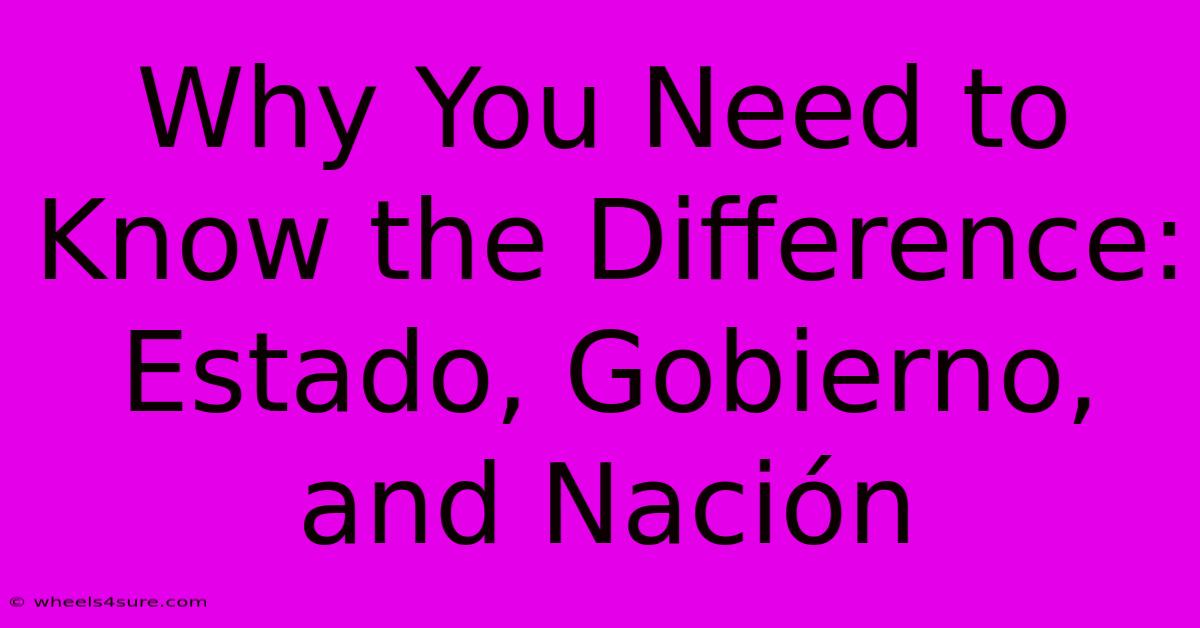Why You Need To Know The Difference: Estado, Gobierno, And Nación

Table of Contents
Why You Need to Know the Difference: Estado, Gobierno, and Nación
Understanding the distinctions between Estado, Gobierno, and Nación is crucial for comprehending political systems, especially in Spanish-speaking contexts. While often used interchangeably, these terms represent distinct yet interconnected concepts. Confusing them can lead to misunderstandings about power structures, sovereignty, and national identity. This article clarifies these differences and explains why understanding them matters.
Estado: The Permanent Entity
Estado, often translated as "state," refers to the permanent political entity. It encompasses the entire apparatus of government, including its institutions, laws, and territory. Think of it as the physical embodiment of a country, a continuous entity that persists beyond changes in its leadership. The Estado possesses sovereignty – the supreme authority within its borders – and is responsible for maintaining order, protecting its citizens, and representing the nation on the international stage. Key characteristics include:
- Sovereignty: Supreme authority within its territory.
- Territory: Defined geographical boundaries.
- Population: A group of people residing within the territory.
- Government: The group of people who administer the Estado.
Gobierno: The Temporary Administration
Gobierno, translated as "government," refers to the group of people currently administering the Estado. This is a temporary entity. Governments change through elections, coups, or other means, but the Estado remains. The Gobierno is responsible for implementing the laws and policies of the Estado, managing its resources, and representing its interests. It is essentially the executive branch of the Estado, but also encompasses the legislative and judicial branches within its structure. Key aspects include:
- Temporality: Governments are transient; they change over time.
- Administration: Responsible for executing the Estado's policies.
- Accountability: Subject to the laws and constitution of the Estado.
Nación: The Shared Identity
Nación, translated as "nation," refers to a group of people who share a common identity, often based on language, culture, history, or ethnicity. This is a concept based on shared feelings of belonging and collective identity. A nation can exist without having its own Estado, as seen with numerous stateless nations throughout history. The Nación provides the Estado with its legitimacy and purpose, but the Estado does not define the Nación. Important considerations are:
- Shared Identity: A sense of community based on commonalities.
- Cultural Bonds: Language, customs, traditions, and values.
- Historical Consciousness: A shared understanding of the past.
- Potential for Self-Determination: The desire to govern oneself.
Why the Distinction Matters
Understanding the differences between Estado, Gobierno, and Nación is critical for several reasons:
- Political Analysis: It allows for a clearer understanding of political power dynamics and how they change over time.
- Historical Context: It provides a framework for analyzing the evolution of states and nations.
- Legal Interpretation: It clarifies the roles and responsibilities of different governmental bodies.
- Civic Engagement: It empowers citizens to better participate in the political process and hold their government accountable.
- International Relations: It aids in understanding international interactions, especially concerning sovereignty and national interests.
In conclusion, while the terms Estado, Gobierno, and Nación are often used interchangeably, they represent distinct concepts crucial for comprehending political structures and social dynamics. Grasping their differences allows for a more nuanced and accurate understanding of the complex interplay between government, state, and national identity. Learning this distinction fosters a deeper appreciation for the intricacies of political science and the realities of national existence.

Thank you for visiting our website wich cover about Why You Need To Know The Difference: Estado, Gobierno, And Nación. We hope the information provided has been useful to you. Feel free to contact us if you have any questions or need further assistance. See you next time and dont miss to bookmark.
Featured Posts
-
Boost Your Immunity Naturally Learn About Antibodies
Apr 02, 2025
-
Harlem Eubanks Father His Life His Influence
Apr 02, 2025
-
The Rise Of Sir Jim Ratcliffe A Wealth Story
Apr 02, 2025
-
Tony Fernandess Net Worth Surprising Sources Of Income
Apr 02, 2025
-
Jon Olsson Net Worth A Wealth Of Information
Apr 02, 2025
